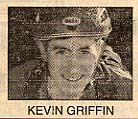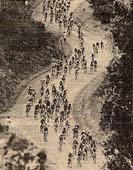|
 Top cyclist faces long night's
journey into day Top cyclist faces long night's
journey into day
by Kevin Griffin
The Vancouver Sun, August
18, 1995, B.6
VANCOUVER, B.C. -- Monday, Keith Fraser
will start cycling at 8 p.m. in Paris. If everything goes well,
he won't stop until 2 a.m. Wednesday morning. That's 30 hours
of continuous cycling. Of course, if he's not feeling too tired
at that point, he might even try to keep going for another five
hours until 7 a.m. -- when he takes his first 20-minute break.
Fraser is probably the finest randonneur in British Columbia,
a consistent placer in endurance cycling. In this race, which
many might think of as sheer craziness, he won't be alone. Along
with 3,000 other long distance cyclists, or randonneurs, Fraser
will be competing in the Paris-Brest-Paris Randonnee.
Held every four years, the first ride was
in 1891, making it a little older than the better known Tour
de France. Although the randonnee started as a professional race,
by the  1940s it had become a long-distance
ride for amateurs. Since then, it has become the number 1 marathon
cycling event among the small international community of randonneurs,
Fraser said. Participants must cycle 1,200 kilometres (about
750 miles) within 90 hours. The terrain to and from Brest is
similar to Highway 99 from North Vancouver to Whistler -- lots
of hills but no long, tortuous climbs up mountains. To qualify,
Fraser and 17 others from B.C. who are riding in the race had
to cycle in rides of 200, 300, 400 and 600 km. To train for the
event, the 36-year-old Fraser cycled about 25 hours a week for
the past five months. On weekends, he'd ride for up to 10 hours. 1940s it had become a long-distance
ride for amateurs. Since then, it has become the number 1 marathon
cycling event among the small international community of randonneurs,
Fraser said. Participants must cycle 1,200 kilometres (about
750 miles) within 90 hours. The terrain to and from Brest is
similar to Highway 99 from North Vancouver to Whistler -- lots
of hills but no long, tortuous climbs up mountains. To qualify,
Fraser and 17 others from B.C. who are riding in the race had
to cycle in rides of 200, 300, 400 and 600 km. To train for the
event, the 36-year-old Fraser cycled about 25 hours a week for
the past five months. On weekends, he'd ride for up to 10 hours.
He knows what kind of physical demands
the ride will place on his body. Fraser rode in the Paris-Brest-Paris
in 1991, finishing in about 200th place after 67 hours. And,
in 1994, he competed in a similar long-distance event -- the
1,200-km Boston-Montreal-Boston ride -- but had to drop out when
his knee became swollen after 900 kilometres and 33 hours of
cycling. If everything goes well this time and he doesn't experience
any injuries or bike problems, Fraser feels he could finish in
50 hours, good enough to put him in the top 25. Four years ago,
the fastest rider didn't sleep a wink and finished in 44 hours.
The last time around, Fraser rode solo through the French countryside,
cramming all his extra batteries and power bars on to bags on
his bike. This time, he's sharing a crew with Ted Milner, a kinesiologist
from Simon Fraser University. They'll tag along to provide support,
including food snacks, to the athletes.
As for being able to cycle for a length
of time most people can't imagine, Fraser says it's all a matter
of being in shape. After a certain point, you reach a level where
you can maintain a steady pace for hours. The fatigue sets in,
he says, only when you stop. What keeps him going is the appeal
of setting a goal and doing his best to reach it. For the Paris-Brest-Paris
ride, there's also the French attitude toward cycling. ``You
get a lot of support from people along the way,'' Fraser said.
``You'll be cycling in a small French village at 2 a.m. and someone
will be out there to cheer you on. In France, they really do
appreciate cycling.''
In other cycling news, it looks as if Vancouver
taxpayers could save as much as $13 million on the proposed Burrard
Street Bridge upgrade. So far, the engineering department has
narrowed the options down to two: $2 million for turning an existing
lane of traffic in either direction into lanes for cyclists,
in-line skaters and other non-motorized forms of transportation;
or $15 million for a freeway-style off-ramp and modifications
to the outside of the bridge to accommodate cyclists et al. Most
community and interest groups favor the $2 million option. If
all goes well, council could vote on the plan this fall. Construction
could start almost immediately afterward. |